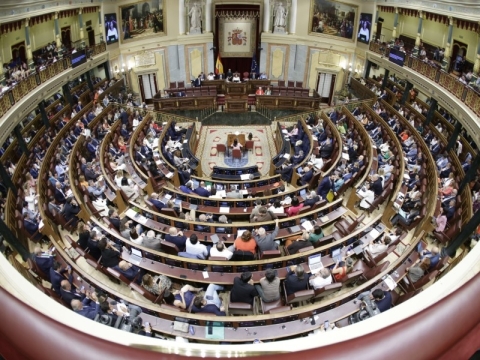Politics
Spanish Parliament approved the Law on amnesty
Benefits 400 Catalan pro-independence
USPA NEWS -
The Plenary Session of the Spanish Congress of Deputies approved on Thursday the Proposal for an Organic Law on amnesty for institutional, political and social normalization in Catalonia by 177 votes in favor and 172 votes against. The initiative, which came to the Chamber through an initiative of the Socialist Group, began its processing on December 12, with the taking into consideration.
Upon approval of the text, amnesty has been granted, as expressed in the first article, for the "acts determining criminal, administrative or accounting liability, executed within the framework of the consultations held in Catalonia on November 9, 2014, and on October 1, 2017, its preparation or its consequences, provided that they were carried out between November 1, 2011, and November 13, 2013". From the seats on the right, voices arose accusing the Government and the socialist deputies of being "traitors" for erasing the crimes associated with the unilateral declaration of independence of the Spanish region of Catalonia.
But the approval of the law does not entail its immediate application. In Spanish legislation, there is a period of two months for the law to be published in the official gazette. And long before that happens, the parliamentary opposition and several regions led by Madrid have filed appeals before the Constitutional Court and the High Court of Justice of the European Union. If the latter admits the demands to be processed, the amnesty law would be suspended and the 400 Catalan politicians who will benefit from it would have to wait for the judicial process to be resolved to enjoy the erasure of their crimes.
In addition, the non-legislative initiatives that were debated on Tuesday in the Plenary have been voted on, starting with the non-law proposals: from the Republican Parliamentary Group, on the fight against corruption, the sewers of the State and the judicial war in the Spanish State which has approved six of the twenty points that were voted on and another from the Sumar Plurinational Parliamentary Group, on the creation of an Economic Information System for Collective Negotiation (SIENN) from official administrative records, which has been rejected.
Next, the Plenary has ruled in relation to the motions resulting from urgent interpellations debated on Tuesday in the Lower House. The first, presented by the Popular group, on the measures that the Government plans to adopt to improve the living conditions of young people in Spain has been approved and the second, by the VOX Parliamentary Group, on the measures that the Government is going to promote before European institutions to guarantee the viability of the Spanish primary sector has been rejected.
The Plenary unanimously approved the taking into consideration of the Proposal of Law, of the Socialist Group, to improve the protection of live organ donors for their subsequent transplant. The proposed text indicates that, with the new regulation, sick leave due to organ donation for transplant is recognized as special situations of temporary disability due to common contingencies.
In addition, the Parliament accepted the taking into consideration of the initiative of the Popular Group regarding the modification of Law 2/2014, of March 25, on the Action and Foreign Service of the State. Among other issues, the new wording aims for the President of the Government to appear in Parliament before the European Councils and "before any foreign policy decision that represents a change with respect to issues contemplated in the Foreign Action Strategy," as stated in the explanatory statement, with 302 votes in favor, 24 against and 14 abstentions.
Liability for this article lies with the author, who also holds the copyright. Editorial content from USPA may be quoted on other websites as long as the quote comprises no more than 5% of the entire text, is marked as such and the source is named (via hyperlink).






